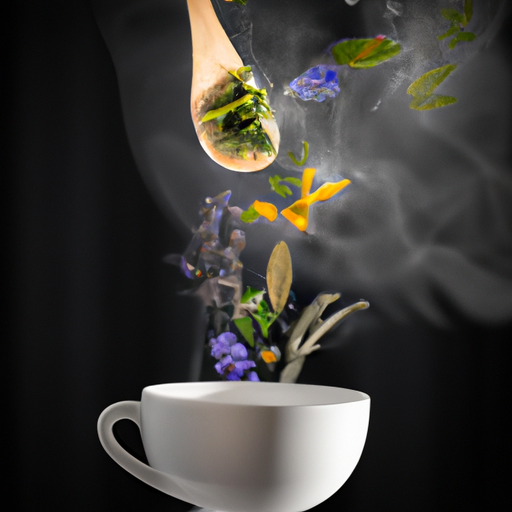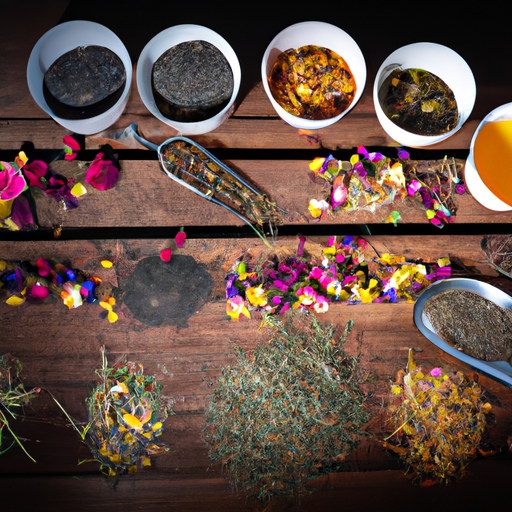Hey there! Do you ever experience the sensation of a small drummer pounding inside your head, making it difficult to concentrate or enjoy your day? Don’t worry, I have some herbal tea remedies that can help alleviate those annoying headaches and provide you with some relief.
Now, I know what you’re thinking – herbal tea? Really? But trust me, these natural wonders have been used for centuries to alleviate headaches and promote overall well-being.
So, put aside those over-the-counter painkillers and let’s dive into the world of herbal teas.
From the refreshing and invigorating peppermint tea to the calming and soothing chamomile tea, there’s a variety of options to choose from.
Ginger tea can also work wonders with its anti-inflammatory properties, while lavender tea can help relax your mind and ease tension.
Lemon balm tea, willow bark tea, rosemary tea, and eucalyptus tea are also fantastic choices for headache relief.
So, join me on this holistic journey as we explore the healing powers of herbal teas and find the perfect blend to soothe your throbbing head.
Let’s get brewing!
Key Takeaways
- Peppermint tea acts as a muscle relaxant and has anti-inflammatory properties, alleviating tension headaches and reducing headache intensity. It can be a natural remedy for stress-induced headaches and provides temporary relief from pain.
- Chamomile tea reduces stress-related headaches and promotes overall well-being.
- Ginger tea has anti-inflammatory properties and improves blood circulation.
- Lavender tea promotes relaxation, aids in sleep, and helps with headaches. It also reduces stress and anxiety contributing to headaches.
Peppermint Tea
If you’re looking for a natural way to ease that pounding headache, peppermint tea is the answer you’ve been searching for! Peppermint tea isn’t just delicious, but it also offers a wide range of benefits for headache relief. The menthol in peppermint tea acts as a muscle relaxant, helping to soothe tension headaches.
Additionally, peppermint tea has anti-inflammatory properties that can alleviate migraines.
To prepare peppermint tea, start by boiling water in a kettle. Once the water’s boiled, pour it over a peppermint tea bag in a cup. Let it steep for about 5 minutes to ensure all the beneficial compounds are released. You can add a teaspoon of honey or a slice of lemon for added flavor, if you’d like.
Sip on this aromatic tea slowly, allowing the soothing warmth and refreshing taste to ease your headache. The menthol in the tea will work its magic, relieving the tension and promoting relaxation.
Now, let’s transition into the next section about chamomile tea, another herbal remedy for headaches.
Chamomile Tea
Chamomile tea is a wonderful herbal remedy that I find incredibly calming and soothing. Its gentle aroma and warm taste help me relax and unwind, making it the perfect beverage for a quiet evening.
Not only does it provide a sense of tranquility, but chamomile tea has also been known to reduce stress-related headaches, offering relief from tension and promoting overall well-being.
Calming and soothing properties
Peppermint tea not only has a refreshing taste but also possesses calming and soothing properties that can help alleviate headaches. It’s calming effects on the mind and body make it a popular choice for those seeking natural remedies.
Peppermint tea contains menthol, which acts as a muscle relaxant, helping to relieve tension and reduce the intensity of headaches. Additionally, its natural analgesic properties can provide temporary relief from pain.
Sipping on a warm cup of peppermint tea can create a sense of relaxation, promoting a tranquil state of mind. This can be particularly beneficial for reducing stress-related headaches.
Incorporating peppermint tea into your daily routine can be a simple and effective way to address headache discomfort and promote overall well-being.
Reduces stress-related headaches
To alleviate stress-related headaches, you can rely on the calming and soothing properties of peppermint tea. This natural remedy has been used for centuries to promote relaxation and reduce tension, making it an excellent choice for those suffering from stress-induced headaches. Incorporating peppermint tea into your daily routine can not only provide relief from headaches but also promote overall well-being.
Here are three ways peppermint tea can help reduce stress-related headaches:
-
Peppermint tea acts as a natural muscle relaxant, helping to relieve tension and ease headache symptoms.
-
The menthol in peppermint tea has a cooling effect on the body, providing a sense of calm and relaxation.
-
Drinking peppermint tea can promote better sleep, which is crucial for managing stress and preventing headaches.
In addition to herbal teas, making certain lifestyle changes can also help alleviate stress-related headaches. Transitioning into the subsequent section about ginger tea, let’s explore another effective natural remedy for headaches.
Ginger Tea
Try brewing some ginger tea to help alleviate your headache and enjoy the soothing warmth and spicy flavor it provides. Ginger tea has been used for centuries to treat various ailments, including headaches. It contains compounds like gingerol, which have anti-inflammatory properties that can help reduce pain and inflammation associated with headaches. Additionally, ginger tea can help improve blood circulation, which may further relieve headache symptoms.
To make ginger tea, start by peeling and slicing a fresh ginger root. Then, bring a pot of water to a boil and add the ginger slices. Let it simmer for about 10 minutes to allow the ginger to infuse into the water. You can sweeten the tea with honey or add a squeeze of lemon for extra flavor.
Apart from its headache-relieving properties, ginger tea has numerous other benefits. It can aid in digestion, reduce nausea, and boost the immune system. It also has antioxidant and anti-inflammatory effects, which can help promote overall health and well-being.
Transitioning to the subsequent section about lavender tea, another herbal tea that can help with headaches, it’s important to explore different options to find the one that works best for you.
Lavender Tea
Indulge in the calming aroma and gentle taste of lavender tea to find relief from your throbbing head. Lavender tea isn’t just a delightful beverage, but it also offers numerous benefits for relaxation and sleep. Here are three reasons why lavender tea should be a part of your daily routine:
-
Relaxation: Lavender has long been known for its soothing properties. Sipping on a warm cup of lavender tea can help calm your mind and body, reducing stress and anxiety that may be contributing to your headache.
-
Sleep Aid: Lavender is also renowned for its ability to promote a good night’s sleep. Drinking lavender tea before bed can help you unwind and prepare for a restful slumber, reducing the chances of waking up with a headache.
-
Homemade Lavender Tea: Making lavender tea at home is a simple and enjoyable process. Start by steeping dried lavender flowers in hot water for about 5 minutes. Strain the tea and sweeten with honey if desired. Incorporating this herbal tea into your daily routine can provide consistent relief from headaches and promote overall well-being.
Transitioning to the next section about lemon balm tea, let’s explore another herbal remedy that can help alleviate headaches naturally.
Lemon Balm Tea
Lemon balm tea, with its refreshing citrus flavor, can provide a soothing and invigorating experience, making it an excellent choice for those seeking natural relief from their pounding heads. This wonderful herbal tea has been used for centuries due to its calming effects and natural remedy properties.
The calming effects of lemon balm tea come from its ability to promote relaxation and reduce stress. It contains compounds that interact with certain receptors in the brain, helping to calm the nervous system and alleviate tension headaches. Additionally, lemon balm tea has been found to have mild sedative properties, which can help to promote restful sleep and ease headaches caused by lack of sleep or insomnia.
To fully enjoy the benefits of lemon balm tea, try incorporating it into your daily routine. Brew a cup in the morning to start your day with a sense of calm and focus. Alternatively, sip on a cup in the evening to wind down and prepare for a restful night’s sleep.
In a 2 column and 4 row table:
| Lemon Balm Tea Benefits |
|---|
| Soothes headaches |
| Reduces stress |
| Promotes relaxation |
| Aids restful sleep |
Now, let’s transition to the next section and explore the benefits of feverfew tea, another herbal remedy for headaches.
Feverfew Tea
Feverfew tea, known for its medicinal properties, offers a natural solution for alleviating the discomfort of headaches. This herbal remedy has been used for centuries to provide migraine relief and prevent future headaches. Feverfew tea is made from the leaves of the feverfew plant, which contains compounds that help reduce inflammation and ease pain. It’s believed to work by inhibiting the release of chemicals in the brain that can trigger migraines.
Many people turn to natural remedies like feverfew tea because they’re seeking a holistic approach to their health. Unlike over-the-counter pain medications, feverfew tea doesn’t come with the risk of side effects or dependency. It provides a gentle and natural alternative for those looking to manage their headaches without relying on pharmaceuticals.
To prepare feverfew tea, simply steep one teaspoon of dried feverfew leaves in a cup of boiling water for about 10 minutes. You can drink this tea up to three times a day to help alleviate headache symptoms and prevent future episodes.
Transitioning to the next section, willow bark tea, another herbal tea known for its headache-relieving properties, can also be an effective natural remedy for those seeking relief.
Willow Bark Tea
To find relief from your headaches, you can try sipping on a warm cup of willow bark tea. Willow bark tea has been used for centuries as a natural pain relief remedy and is known for its health benefits.
Here are three reasons why willow bark tea can be an effective alternative headache remedy:
-
Natural Pain Relief: Willow bark contains a compound called salicin, which has similar properties to aspirin. This compound helps reduce inflammation and relieve pain, making it a great option for headache relief.
-
Anti-inflammatory Properties: Inflammation can often contribute to headaches, and willow bark tea has powerful anti-inflammatory properties that can help alleviate this symptom. By reducing inflammation, it may help reduce the intensity and duration of headaches.
-
Relaxing Effects: Willow bark tea has a calming and relaxing effect on the body, which can be beneficial for people experiencing tension headaches. By promoting relaxation, it may help alleviate the muscle tension that often accompanies these types of headaches.
Now that you know the health benefits of willow bark tea for headaches, let’s explore another herbal tea that can provide relief – rosemary tea.
Rosemary Tea
If you’re in need of a refreshing and aromatic beverage that can help soothe your head and relax your mind, look no further than rosemary tea. Rosemary has been used for centuries for its numerous health benefits, and its infusion is no exception.
Not only does rosemary tea have a delightful taste, but it also offers a range of benefits that can potentially alleviate headaches. One of the key benefits of rosemary tea is its ability to relieve tension and promote relaxation. The aroma of rosemary has been shown to have a calming effect on the mind, helping to reduce stress and anxiety, which can often be triggers for headaches. Additionally, rosemary contains compounds that possess anti-inflammatory properties, which can help alleviate pain and reduce the intensity of headaches.
To make a rosemary infusion, simply steep a handful of fresh rosemary leaves in hot water for about 10 minutes. Strain the liquid and enjoy it warm or chilled. You can also add a touch of honey or lemon to enhance the flavor.
Transitioning into the subsequent section about eucalyptus tea, another herbal tea that can provide relief for headaches, let’s explore its benefits and how it can be prepared.
Eucalyptus Tea
With its refreshing minty flavor and soothing properties, eucalyptus tea is like a breath of fresh air for relieving tension and promoting relaxation. Eucalyptus oil benefits are well-known, and this aromatic herbal tea harnesses the power of eucalyptus leaves to offer a myriad of health benefits. Here’s why you should consider incorporating eucalyptus tea into your routine:
-
Respiratory health: Eucalyptus tea is renowned for its ability to support respiratory health. The natural compounds found in eucalyptus leaves, such as cineole, can help alleviate congestion and promote easier breathing. Sipping on a warm cup of eucalyptus tea can provide relief from sinus issues, coughs, and even bronchitis.
-
Anti-inflammatory properties: Eucalyptus tea contains anti-inflammatory compounds that can help reduce inflammation in the body. This makes it a great choice for relieving headaches caused by inflammation, as it can help soothe the blood vessels and alleviate pain.
-
Stress relief: The invigorating aroma of eucalyptus tea can have a calming effect on the mind and body, helping to reduce stress and anxiety. It can also promote better sleep, making it an ideal bedtime beverage.
-
Digestive support: Eucalyptus tea has been used for centuries to aid digestion. It can help alleviate bloating, indigestion, and stomach discomfort.
Transitioning to the subsequent section about ‘peppermint-lavender blend tea’, this herbal blend offers a delightful combination of flavors and additional benefits for headaches and relaxation.
Peppermint-Lavender Blend Tea
The invigorating scent of a steaming cup of peppermint-lavender blend tea transports me to a serene garden, where the refreshing minty notes mingle with the soothing floral undertones, offering a moment of pure relaxation.
This delightful herbal tea not only provides a delightful sensory experience but also offers a range of health benefits.
Peppermint-lavender blend tea is renowned for its calming properties. Peppermint has long been used to relieve headaches, thanks to its natural analgesic properties. Lavender, on the other hand, is known for its ability to reduce stress and promote relaxation. The combination of these two herbs creates a powerful blend that can help alleviate headaches and promote a sense of calm and well-being.
To brew a perfect cup of peppermint-lavender blend tea, start by bringing water to a boil. Pour the hot water over a teaspoon of the tea blend and let it steep for about 5 minutes. This will allow the flavors to infuse into the water, creating a rich and aromatic brew. You can add honey or lemon if desired, although the tea is already naturally sweet and flavorful.
So the next time you find yourself in need of a headache remedy or simply want to unwind, reach for a cup of peppermint-lavender blend tea. Its delightful aroma and soothing properties will transport you to a state of relaxation and well-being.
Frequently Asked Questions
Can herbal tea completely cure my headaches?
Herbal tea can be a wonderful alternative treatment for headaches. While it may not completely cure them, it offers several benefits that can help alleviate the pain. The natural ingredients found in herbal teas have been known to provide soothing effects and promote relaxation.
Additionally, certain herbs like chamomile and peppermint have anti-inflammatory properties that can reduce headache symptoms. Incorporating herbal tea into your routine may bring relief and a sense of overall well-being.
Are there any side effects of drinking herbal tea for headaches?
When it comes to using herbal tea for headaches, it’s important to consider potential risks and interactions with other medications. While herbal teas are generally safe, some individuals may experience allergic reactions or digestive issues.
Additionally, certain herbal teas may interact with medications, so it’s crucial to consult with a healthcare professional if you’re taking any medications. By being mindful of these factors, you can enjoy the natural benefits of herbal tea while minimizing any potential risks.
How long does it take for herbal tea to start relieving my headache?
When it comes to relieving headaches, herbal tea can be an effective natural remedy. It typically takes around 20-30 minutes for herbal tea to start alleviating headache symptoms. Compared to over the counter pain relievers, herbal tea offers a holistic approach by soothing both the mind and body.
Additionally, staying hydrated is crucial as dehydration can often trigger headaches. So, sipping on herbal tea can provide hydration benefits along with headache relief.
Can I drink herbal tea for headaches while taking medication?
Drinking herbal tea for headaches while taking medication can have potential interactions. It’s essential to consult with a healthcare professional before combining the two.
Certain herbal teas, like chamomile or peppermint, may have a calming effect and can be beneficial for headaches. However, some herbal teas can interfere with the absorption or effectiveness of medications.
To ensure safety and effectiveness, it’s best to seek professional advice for a holistic approach to managing headaches.
Are there any precautions or contraindications to consider when consuming herbal teas for headaches?
When consuming herbal teas for headaches, it’s important to consider certain precautions and contraindications. For instance, if you’re pregnant, it’s crucial to consult with your healthcare provider before consuming any herbal tea, as some herbs may not be safe during pregnancy.
Additionally, herbal teas have the potential to interact with certain medications, so it’s advisable to consult with your healthcare provider to ensure there are no potential interactions.
Prioritizing your health and seeking professional advice is always a wise decision.
Conclusion
In conclusion, herbal teas can be a natural and effective remedy for headaches. With their soothing and healing properties, teas like peppermint, chamomile, and ginger can provide relief from headaches and promote overall well-being.
One interesting statistic to consider is that a study conducted on peppermint tea found that it can reduce the frequency and intensity of tension headaches by up to 70%. This remarkable statistic highlights the power of herbal teas in alleviating headaches and inspires us to explore natural remedies for our health concerns.










